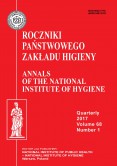Rocz Panstw Zakl Hig 2012, 63(4): 441-446
Ocena spożycia witamin i składników mineralnych w całodziennych racjach pokarmowych studentów Uniwersytetu Rzeszowskiego
[Evaluation of the dietary intake of vitamins and minerals in the daily food rations by the students of the Rzeszow University]
STRESZCZENIE
Wprowadzenie. Prawidłowe funkcjonowanie organizmu człowieka wymaga z żywieniowego punktu widzenia podaży wielu różnorodnych składników odżywczych. Prócz podstawowych składników odżywczych istotną rolę w tym względzie odgrywają witaminy i składniki mineralne. Szczególnej uwagi wymaga żywienie młodzieży studiującej, w żywieniu której obserwuje się wiele nieprawidłowości wynikających ze specyfiki życia studenckiego (nieregularny tryb życia, stres itp.).
Cel badań. Celem badań było określenie i ocena poziomu spożycia wybranych witamin i składników mineralnych w grupie studentów z uwzględnieniem płci.
Materiał i metody. Badania objęły grupę 200 osób studiujących na Wydziale Biologiczno-Rolniczym Uniwersytetu Rzeszowskiego. Oceny spożycia dokonano przy użyciu metody bieżącego notowania spożywanych przez studentów produktów i napojów w kolejnych trzech dniach. Korzystając z Tabel Wartości Odżywczej Produktów Spożywczych i Potraw obliczono średnie dzienne spożycie wybranych składników mineralnych: sodu, potasu, wapnia, fosforu, magnezu, żelaza, cynku, miedzi, manganu oraz wybranych witamin: A, D, E, tiaminy, ryboflawiny, niacyny, witaminy B6, folianów i witaminy B12.
Wyniki. W żywieniu kobiet stwierdzono wyraźnie niedostateczne spożycie witaminy D (49%), folianów (54%) oraz tiaminy i niacyny. W zakresie spożycia składników mineralnych u kobiet zdiagnozowano niedostateczny udział w diecie żelaza (46%), potasu (51,4%), wapnia (55,4%) oraz magnezu (71,6%). W grupie mężczyzn niedobory stwierdzono w przypadku witaminy D (79,4%), folianów (71,6%) i witaminy C (76,0%). Stwierdzono także nadmiar manganu (210,0%), fosforu (198,9%) i sodu (170,2%) w diecie oraz niedobór potasu (65,5%), wapnia (67,0%) i magnezu (73,9%).
Wnioski. Dieta mężczyzn w większym stopniu realizuje zapotrzebowanie na witaminy i składniki mineralne. Wyniki badań wskazują na konieczność edukacji w celu kształtowania prawidłowych nawyków żywieniowych i zwiększenia udziału w diecie naturalnych źródeł witamin i składników mineralnych, aby zapobiegać występowaniu negatywnych objawów związanych z ich niewystarczającym spożyciem.
ABSTRACT
Background. To function properly the human body needs, from a nutritional point of view, the supply of a wide variety of nutrients. In this respect, in addition to essential nutrients, vitamins and minerals play an important role. Particular attention should be paid to the nutrition of studying youth as in their diet there are observed many irregularities arising from the specific nature of student life .
Objective. The aim of the study was to identify and assess the level of intake of selected vitamins and minerals in a group of students with consideration of gender.
Material and methods. The study included the group of 200 persons studying at the Faculty of Biology and Agriculture at the University of Rzeszów. The assessment of intake was made using the method of immediate recording of products and beverages consumed by students within three successive days. Using the Tables of Nutritional Value of Foods and Dishes there was calculated the average daily intake of minerals (sodium, potassium, calcium, phosphorus, magnesium, iron, zinc, copper, manganese) and vitamins (A, D, E, thiamine, riboflavin, niacin, vitamin B6, folates and vitamin B12).
Results. It was found that the nutrition of women had seriously deficient intake of vitamin D (49%), folates (54%), thiamine and niacin. In terms of mineral intake in women there was diagnosed insufficient contribution of iron (46%), potassium (51.4%), calcium (55.4%) and magnesium (71.6%) in the diet. In the group of men deficiencies were found in the case of vitamin D (79.4%), foliates (71.6%) and vitamin C (76.0%). The excess of manganese (210.0%), phosphorus (198.9%), sodium (170.2%) in the diet and deficiency of potassium (65.5%), calcium (67.0%) and magnesium (73.9%) were found.
Conclusions. The diet of men to a greater extent fulfils the need for vitamins and minerals. The results of the study show the necessity of education in order to foster healthy nutritional habits and to increase the share of natural sources of vitamins and minerals in the diet to prevent the occurrence of adverse effects related to their insufficient consumption.
Liczba pobrań: 3495


